

cratosroyalbet palacebet cratosroyalbet giriş betwild giriş palacebet giriş betwoon radissonbet royalbet giriş betwoon giriş royalbet betwild hızlıbahis spinco maxwin superbet damabet superbet giriş damabet giriş grandpashabet giriş betgit Bycasino Tipobet bayspin betorspin sahabet onwin
Read More
Read More
Read More
Read More
Read More
Read More
Read More
In addition to environmental sustainability, we acknowledge the importance of social sustainability and equity. We strive to create an inclusive and diverse campus community that respects and celebrates individuals from all backgrounds: regardless of age, religious belief, race, social standing and nationality.
UCSI University recognised the vital importance of the Sustainable Development Goals (SDGs) and the pressing necessity of low-carbon strategies for global and local communities. In our commitment to these globally shared priorities, we are resolutely taking decisive steps towards a sustainable future.
It is with great optimism and ambition that we hereby pledge our commitment to achieving net zero carbon emissions by 2050. We understand the scale of the challenge that lies ahead of us, but we firmly believe in our collective ability to rise to this challenge, innovate, and achieve our aspirations.
Our journey to carbon neutrality will involve the active participation of our entire university community. From our faculty and staff, to our students and alumni, every member of our community has a role to play in this transition. As part of this commitment, we are dedicated to developing and implementing an array of sustainable initiatives, operational improvements, and academic programmes focused on environmental sustainability.
Net Zero Carbon by 2050 is a considerable challenge, but it is one we embrace with purpose and determination. Together with our students, staff, partners, and all stakeholders, we take this journey to transform our shared vision of a sustainable, low-carbon future into reality.
This report describes the steps being taken and will be taken to reach at least 50% reduction in our carbon emission by 2030. The focus is on Scope 1 and 2, and part of Scope 3, with the view that the complete Scope 3 will be covered later in reaching the Net Zero by 2050.
UCSI University has embarked on regular initiatives to plant trees, and more of them including the mangroves in the near future. We anticipate that with clearer mechanism in carbon offsetting, such carbon sequestration exercises will be factored in for the Net Zero calculation eventually.
Key Commitments


Interim Goal: Reduce carbon emissions by at least 50% by 2030, focusing on Scope 1 and 2, and part of Scope 3 emissions.

Community Engagement: Involve our entire university community, including faculty, staff, students, and alumni, in this transition.
Our Approach


Operational Improvements: Enhance efficiency across university operations.

Academic Focus: Create and expand programmes centered on environmental sustainability.
Carbon Sequestration Efforts

Regular tree planting initiatives, including future mangrove restoration projects.

Anticipate incorporating carbon sequestration exercises into future Net Zero calculations as carbon offsetting mechanisms become clearer.
Ongoing Plans and Targets (2025-2030)
| Category | 2025 – 2026 | 2027 – 2030 |
|---|---|---|
| Carbon Reduction Initiatives | ||
| Electricity |
|
|
| Transportation |
|
|
| Sustainable Building Design |
|
|
| Supply Chain Management |
|
|
| Environmental Management | ||
| Water Conservation |
|
|
| Waste Reduction |
|
|
| Green Office Initiative |
|
|
| Sustainable Building Features |
|
|
| Corporate Social Responsibility (CSR) Projects |
|
|
Sustainability Impact Analysis: Electricity, Water, Waste, Diesel, Petrol and Overall eCO₂ Emissions (2018–2030)
Tracking our progress in optimising resource usage, reducing waste and achieving sustainability targets by 2030.
-
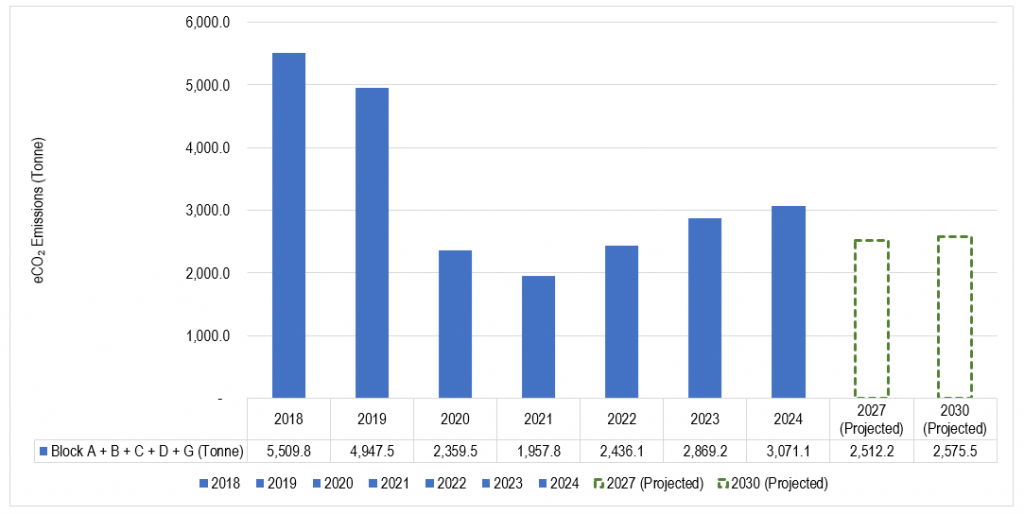 eCO₂ Emissions from Electricity Usage (2018–2030: Actual and Projected)eCO₂ emissions from electricity usage are projected to drop to 2,575.5 tonnes by 2030,
eCO₂ Emissions from Electricity Usage (2018–2030: Actual and Projected)eCO₂ emissions from electricity usage are projected to drop to 2,575.5 tonnes by 2030,
representing a 53.25% reduction compared to 2018 -
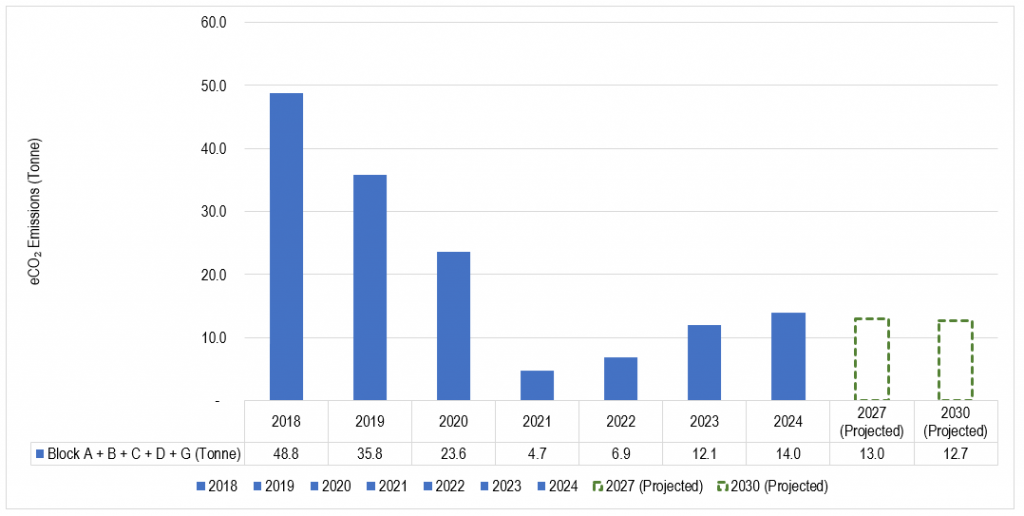 eCO₂ Emissions from Water Usage (2018–2030: Actual and Projected)eCO₂ emissions from water usage are projected to drop to 12.7 tonnes by 2030,
eCO₂ Emissions from Water Usage (2018–2030: Actual and Projected)eCO₂ emissions from water usage are projected to drop to 12.7 tonnes by 2030,
representing a 73.98% reduction compared to 2018 -
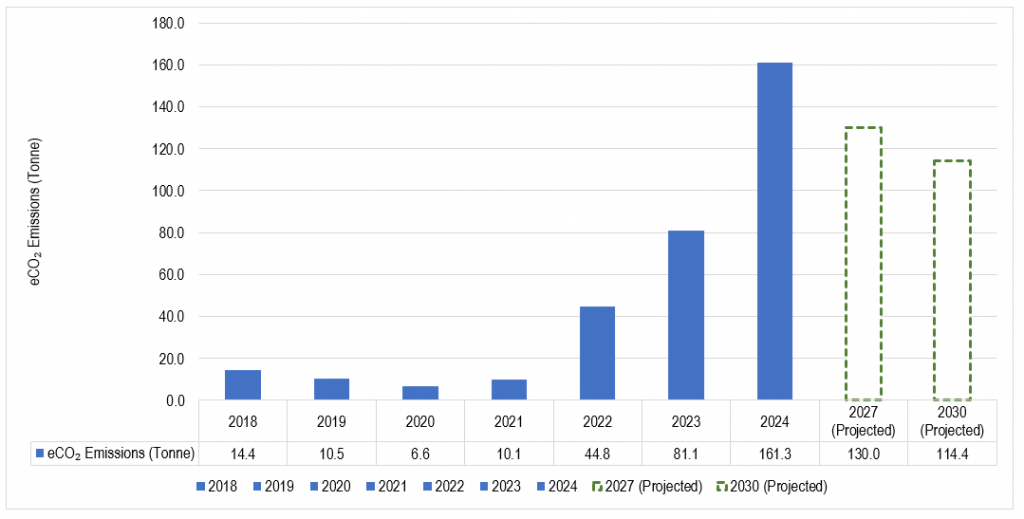 eCO₂ Emissions from Waste Usage (2018–2030: Actual and Projected)
eCO₂ Emissions from Waste Usage (2018–2030: Actual and Projected) -
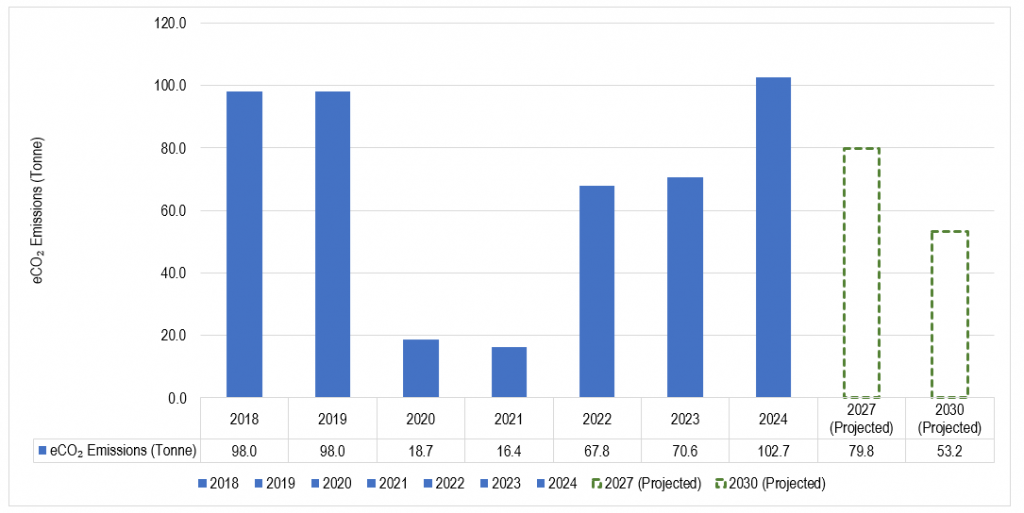 eCO₂ Emissions from Diesel Usage (2018–2030: Actual and Projected)eCO₂ emissions from diesel usage are projected to drop to 53.2 tonnes by 2030, representing a
eCO₂ Emissions from Diesel Usage (2018–2030: Actual and Projected)eCO₂ emissions from diesel usage are projected to drop to 53.2 tonnes by 2030, representing a
45.7% reduction compared to 2018.This reduction is driven by plans to replace our current buses with electric vehicles. -
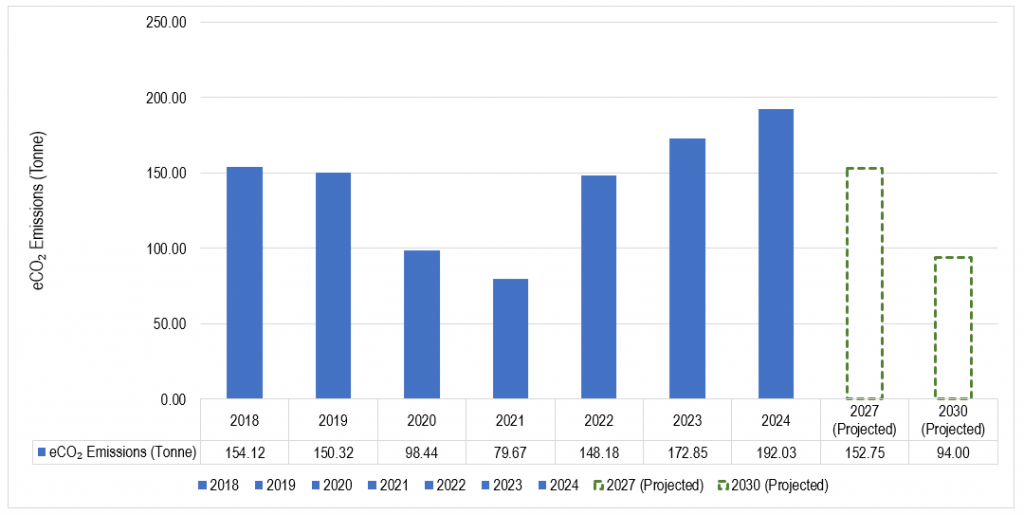 eCO₂ Emissions from Petrol Usage (2018–2030: Actual and Projected)eCO₂ emissions from petrol usage are projected to drop to 94 tonnes by 2030, representing a 39% reduction compared to 2018.
eCO₂ Emissions from Petrol Usage (2018–2030: Actual and Projected)eCO₂ emissions from petrol usage are projected to drop to 94 tonnes by 2030, representing a 39% reduction compared to 2018. -
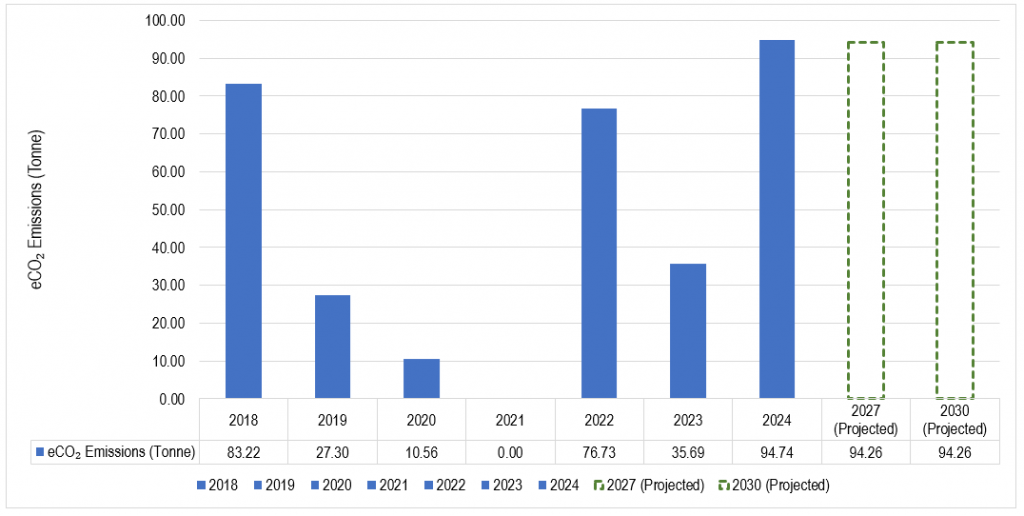 eCO₂ Emissions from Employee Business Travel (2018–2030: Actual and Projected)
eCO₂ Emissions from Employee Business Travel (2018–2030: Actual and Projected) -
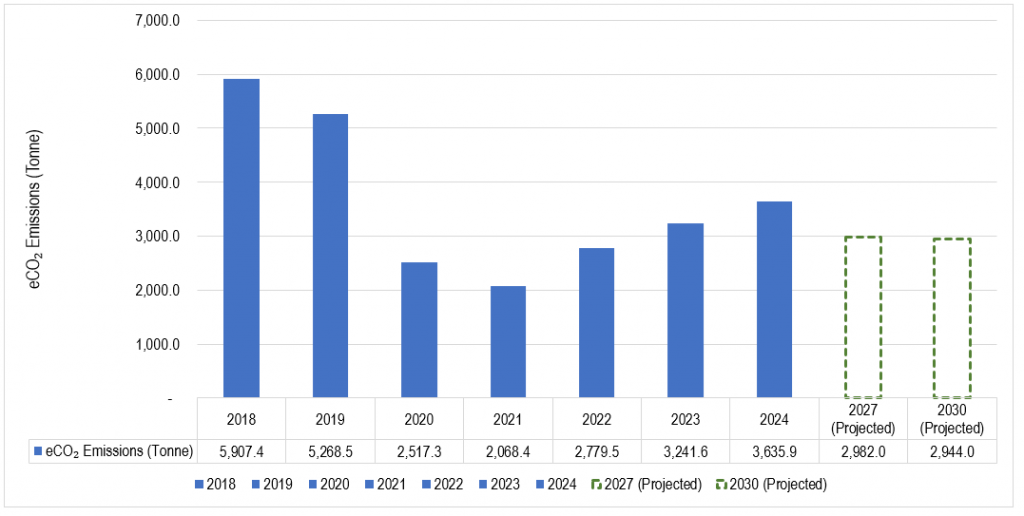 Total eCO₂ Emissions (2018–2030: Actual and Projected)Total eCO₂ emissions are projected to drop to 2,944 tonnes by 2030, representing a
Total eCO₂ Emissions (2018–2030: Actual and Projected)Total eCO₂ emissions are projected to drop to 2,944 tonnes by 2030, representing a
50.2% reduction compared to 2018. -
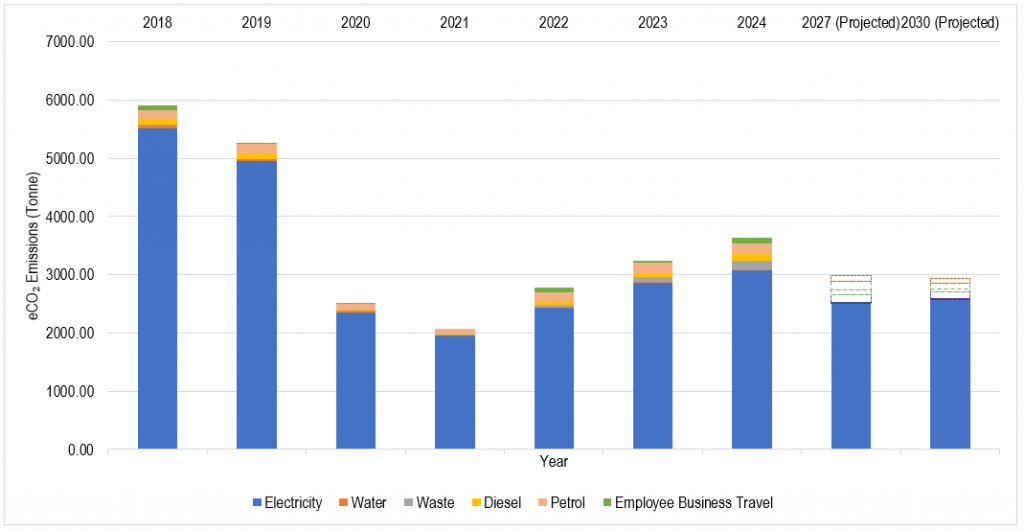 Overall eCO₂ Emissions (Tonne) From Electricity, Water, Petrol, Diesel Usage,
Overall eCO₂ Emissions (Tonne) From Electricity, Water, Petrol, Diesel Usage,
Waste Generation and Employee Business Travel (2018–2030: Actual and Projected) -
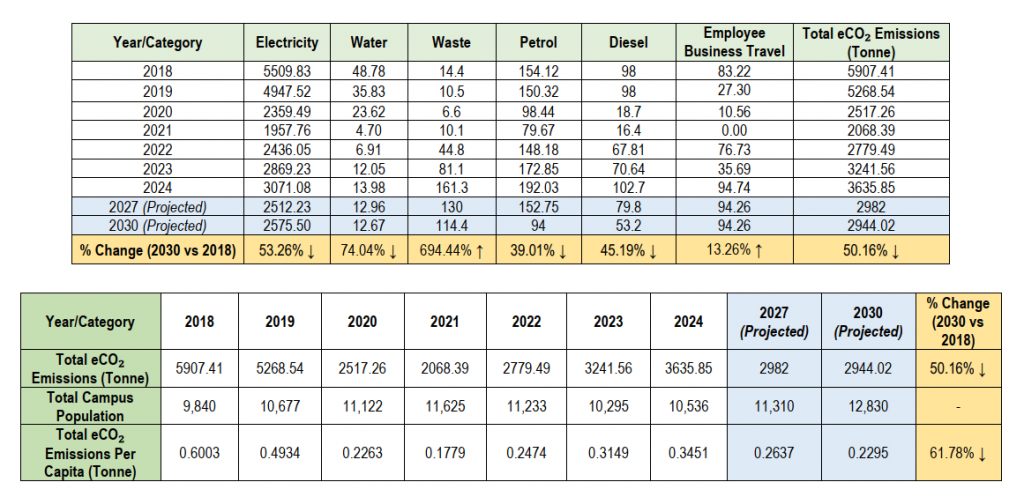 Overall eCO₂ Emissions (Tonne) From Electricity, Water, Petrol, Diesel Usage,
Overall eCO₂ Emissions (Tonne) From Electricity, Water, Petrol, Diesel Usage,
Waste Generation and Employee Business Travel (2018–2030: Actual and Projected)